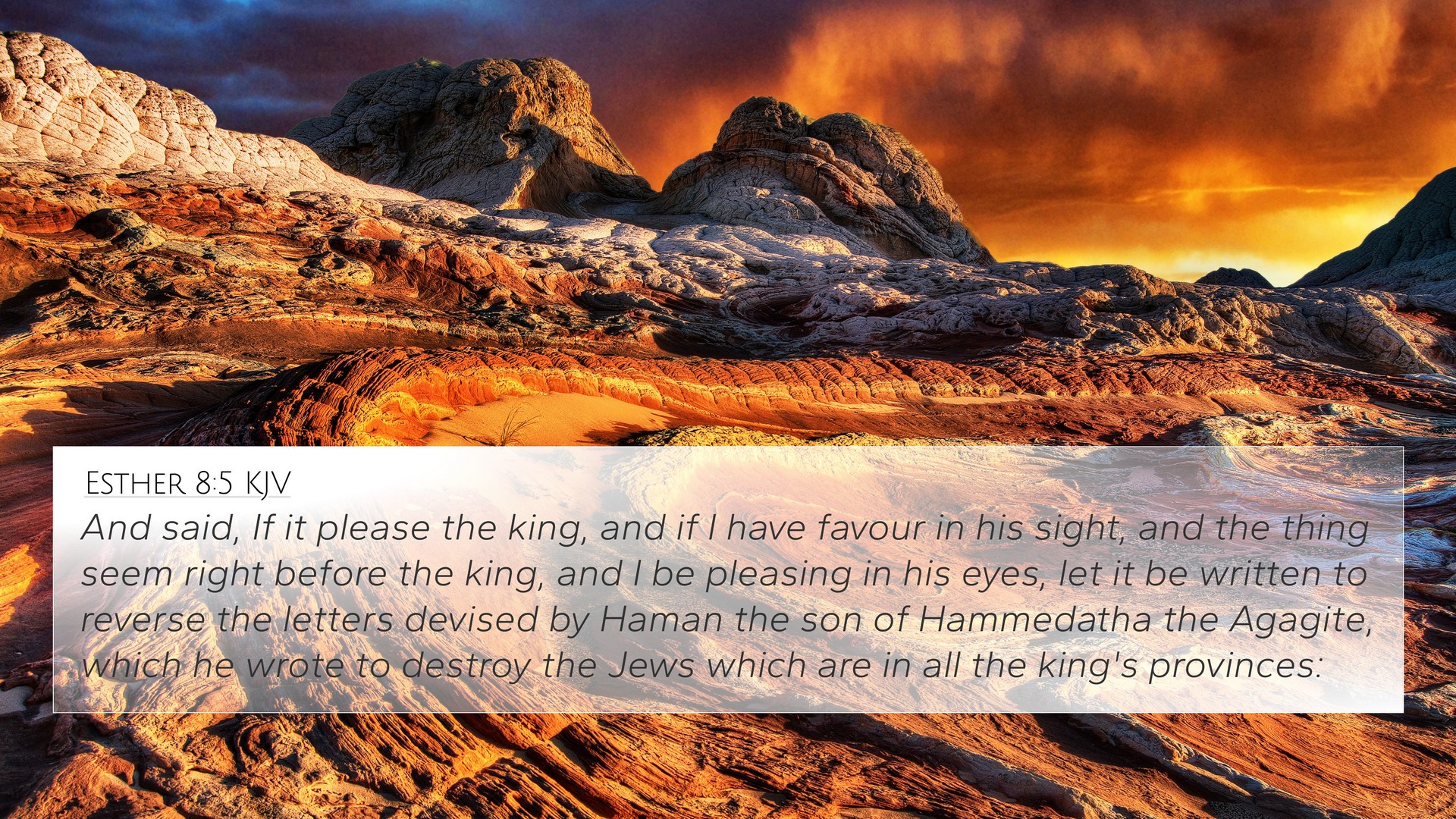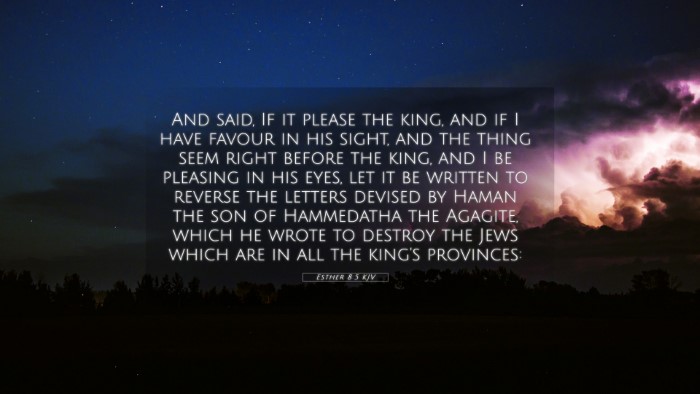Old Testament
Genesis Exodus Leviticus Numbers Deuteronomy Joshua Judges Ruth 1 Samuel 2 Samuel 1 Kings 2 Kings 1 Chronicles 2 Chronicles Ezra Nehemiah Esther Job Psalms Proverbs Ecclesiastes Song of Solomon Isaiah Jeremiah Lamentations Ezekiel Daniel Hosea Joel Amos Obadiah Jonah Micah Nahum Habakkuk Zephaniah Haggai Zechariah MalachiEsther 8:5 Similar Verses
Esther 8:5 Cross References
And said, If it please the king, and if I have favour in his sight, and the thing seem right before the king, and I be pleasing in his eyes, let it be written to reverse the letters devised by Haman the son of Hammedatha the Agagite, which he wrote to destroy the Jews which are in all the king's provinces:
Uncover the Rich Themes and Topics of This Bible Verse
Listed below are the Bible themes associated with Esther 8:5. We invite you to explore each theme to gain deeper insights into the Scriptures.
Esther 8:5 Cross Reference Verses
This section features a detailed cross-reference designed to enrich your understanding of the Scriptures. Below, you will find carefully selected verses that echo the themes and teachings related to Esther 8:5 KJV. Click on any image to explore detailed analyses of related Bible verses and uncover deeper theological insights.
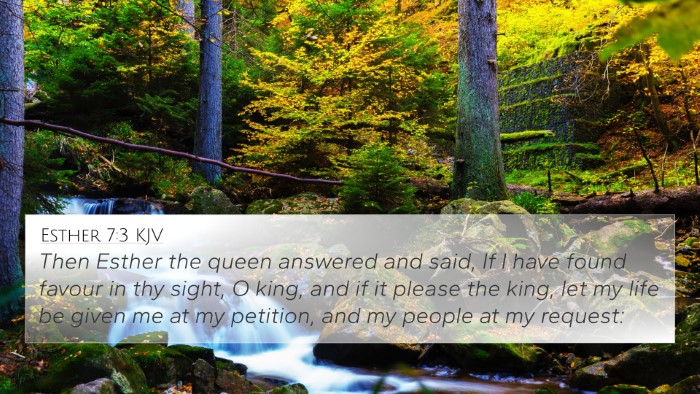
Esther 7:3 (KJV) »
Then Esther the queen answered and said, If I have found favour in thy sight, O king, and if it please the king, let my life be given me at my petition, and my people at my request:
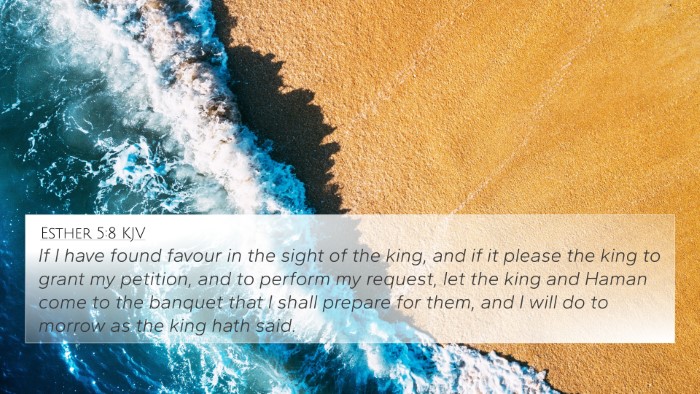
Esther 5:8 (KJV) »
If I have found favour in the sight of the king, and if it please the king to grant my petition, and to perform my request, let the king and Haman come to the banquet that I shall prepare for them, and I will do to morrow as the king hath said.
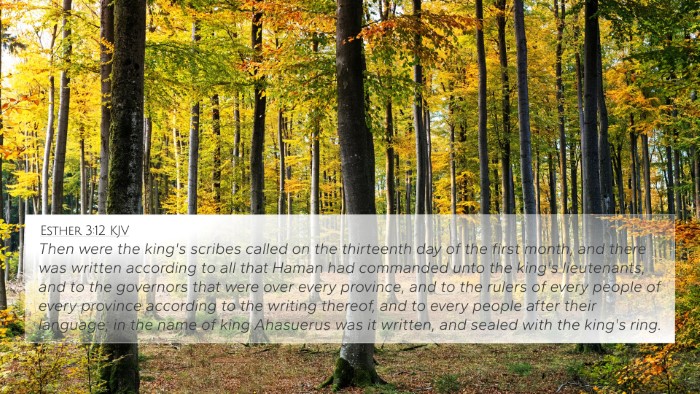
Esther 3:12 (KJV) »
Then were the king's scribes called on the thirteenth day of the first month, and there was written according to all that Haman had commanded unto the king's lieutenants, and to the governors that were over every province, and to the rulers of every people of every province according to the writing thereof, and to every people after their language; in the name of king Ahasuerus was it written, and sealed with the king's ring.
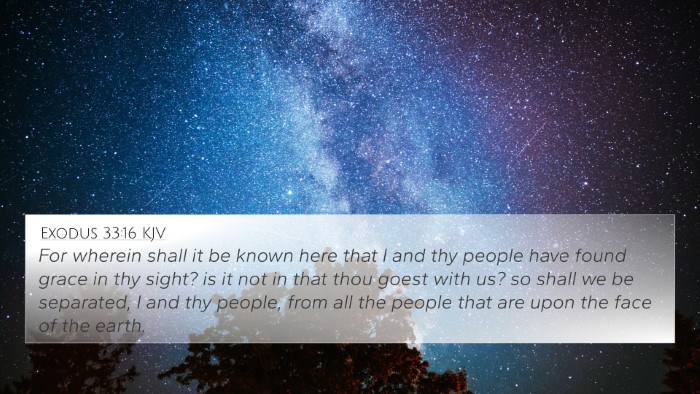
Exodus 33:16 (KJV) »
For wherein shall it be known here that I and thy people have found grace in thy sight? is it not in that thou goest with us? so shall we be separated, I and thy people, from all the people that are upon the face of the earth.
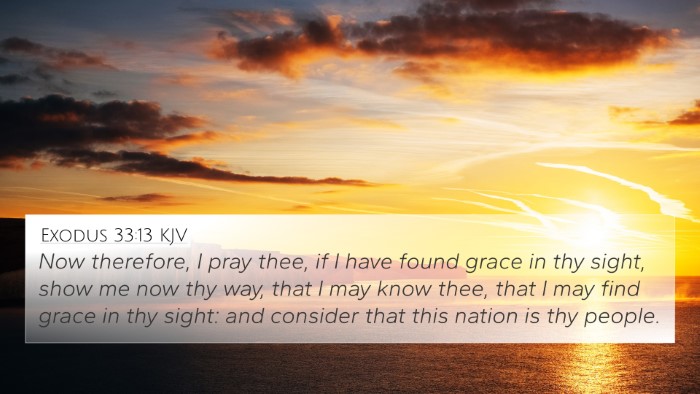
Exodus 33:13 (KJV) »
Now therefore, I pray thee, if I have found grace in thy sight, show me now thy way, that I may know thee, that I may find grace in thy sight: and consider that this nation is thy people.
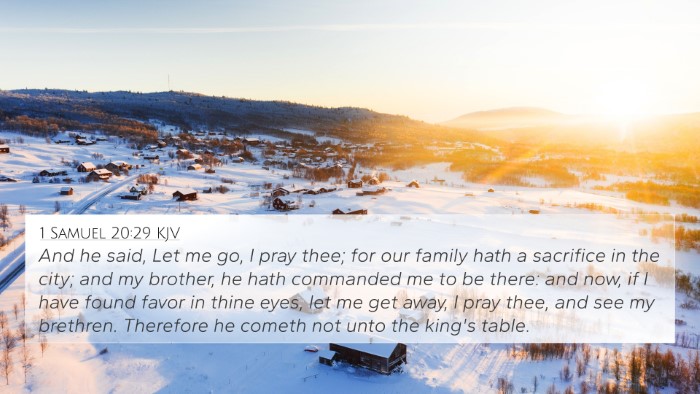
1 Samuel 20:29 (KJV) »
And he said, Let me go, I pray thee; for our family hath a sacrifice in the city; and my brother, he hath commanded me to be there: and now, if I have found favor in thine eyes, let me get away, I pray thee, and see my brethren. Therefore he cometh not unto the king's table.
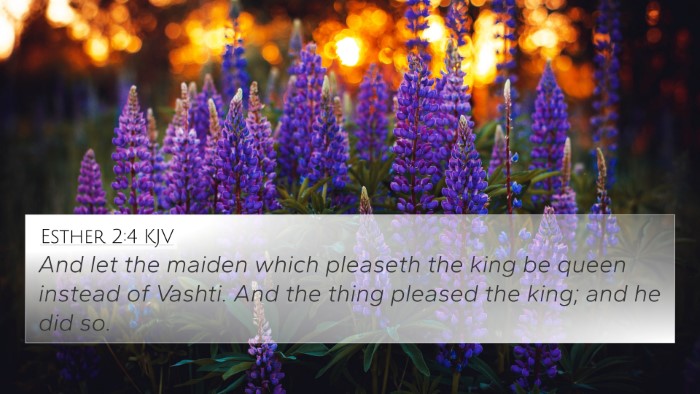
Esther 2:4 (KJV) »
And let the maiden which pleaseth the king be queen instead of Vashti. And the thing pleased the king; and he did so.
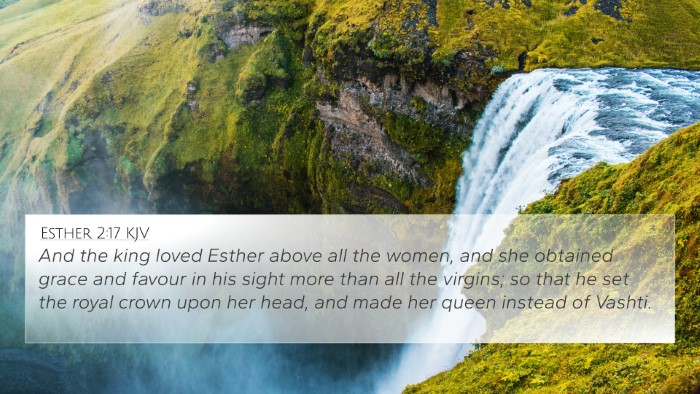
Esther 2:17 (KJV) »
And the king loved Esther above all the women, and she obtained grace and favour in his sight more than all the virgins; so that he set the royal crown upon her head, and made her queen instead of Vashti.
Esther 8:5 Verse Analysis and Similar Verses
Understanding Esther 8:5
Esther 8:5 states, "And said, If it please the king, and if I have found favor in his sight, and the thing seem right before the king, and I be pleasing in his eyes, let it be written to reverse the letters devised by Haman the son of Hammedatha, the Agagite, which he wrote to destroy the Jews which are in all the king's provinces." This verse encapsulates Esther's bold plea to King Ahasuerus, demonstrating her courage and the significance of her intercession for the Jewish people.
Verse Analysis
In this verse, Esther appeals to the king, invoking his favor and seeking to reverse the decree initiated by Haman. This reflects a broader theme in the Book of Esther related to the providence of God and the deliverance of His people.
Historical Context
The Book of Esther is set during the Exile period of the Jewish people, highlighting the struggles they faced under foreign rule. Esther's position as queen gives her a unique opportunity to advocate for her people, which she approaches with wisdom and humility.
Thematic Insights
Esther 8:5 emphasizes several key themes:
- Courage in Advocacy: Esther's willingness to approach the king is a testament to her bravery and dedication to her people.
- The Role of Divine Providence: This event underscores God's sovereignty in protecting the Jewish people's future.
- Intercession: Esther acts as a mediator, a key biblical concept that highlights the importance of intercessory prayer and advocacy.
Commentary Insights
Matthew Henry emphasizes the courage of Esther, noting that her appeal to the king not only reflects her faith but also God's active role in turning events in favor of His people. He states that this instance serves as an example of God’s providential care and the necessity of human agency in the divine plan.
Albert Barnes discusses the importance of Esther's request, framing it as not only a personal plea but also a matter of national survival. He points out that her humility and approach reflect a deep understanding of her position and the potential ramifications of her request.
Adam Clarke interprets this moment as pivotal in the narrative of Esther, viewing it as an exhibit of faith and confidence in the king's justice. He highlights that her plea serves as an invitation for the king to reconsider his previously made decision under manipulation by Haman.
Cross References
Esther 8:5 connects with several other scripture passages, highlighting the theme of divine justice and advocacy. Notable cross-references include:
- Esther 7:3: Esther's earlier appeal to the king reveals her deep concern for her people.
- Esther 4:16: Esther's willingness to risk her life to save her people.
- Exodus 32:11-14: Moses interceding for the Israelites demonstrates a similar act of advocacy.
- Psalm 37:5: The act of committing one’s way to the Lord reflects the confidence found in Esther's request.
- Proverbs 21:1: Highlights the king's heart being in the hand of the Lord, affirming God's role in influencing decisions.
- James 5:16: Encouragement to pray for one another, resonating with Esther's mediating role.
- Philippians 4:6-7: The instruction to be anxious for nothing but to make requests known to God aligns with Esther’s approach.
Connecting Insights
The connections between Esther 8:5 and other scriptures offer a glimpse into the overarching narrative of God's redemption plan for His people. The plea represents not just an individual approach but contributes to the building of a larger theme of deliverance found throughout scripture.
The verse showcases the importance of faith and action in the believer's life, encouraging deeper engagement with the biblical texts and fostering an understanding of how one verse can resonate through various situations and themes found in both the Old and New Testaments.
Conclusion
Esther 8:5 stands as a testament to the power of faithful intercession and the profound impact of individual courage within the grand tapestry of God's salvation history. It encourages believers to draw from Esther’s example and seek God's favor on behalf of others, knowing that He is actively involved in our circumstances.
Further Study
For those wishing to deepen their understanding of Esther 8:5 and its themes, utilizing tools for Bible cross-referencing can enhance one's study. Resources such as a Bible concordance or a cross-reference Bible study guide can be particularly beneficial.
